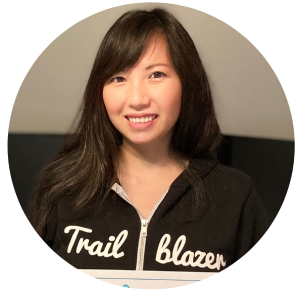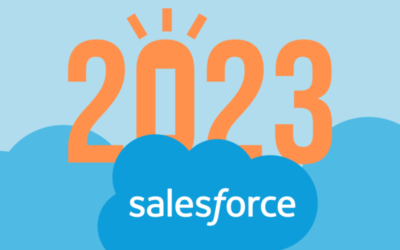
Tips for Salesforce Marketing Cloud Certifications
A Salesforce certification not only demonstrates your knowledge, but it also helps you stand out in a competitive job market.
Salesforce has become a prominent name in the workplace; its economy is expected to create 9.2 million new jobs by 2026. To stand out in a competitive market, a Salesforce certification can be a valuable asset. They are highly regarded because they require a level of knowledge and competency to pass. According to a 2020/2021 Mason Frank survey of Salesforce professionals:
77% of respondents hold at least one Salesforce certification
Another 10% are working towards a certification
43% of those certified experienced an increase in their salary after earning a certification
Why Salesforce Marketing Cloud (SFMC)? I was introduced to SFMC in 2016 when I took on my first email marketing role. It was my first exposure to Salesforce. I was onboarded right before Christmas and was sending emails to our customers after a week of training. I worked with another email marketing specialist in the beginning, and she did a phenomenal job training me.
I had used other ESPs before, but SFMC was the most advanced and comprehensive platform I had used at the time. I was fortunate enough to have access to features like Journey Builder, Predictive Intelligence (Einstein), and Audience Builder early on, which helped build the foundation of my SFMC knowledge. That experience became the launchpad for other SFMC opportunities. Over the years, I’ve continued to grow my skills through the everyday use of the product, accelerators, and self-help resources. I’ve also realized that my favorite way to learn is through troubleshooting and finding creative solutions to problems within SFMC. Learn more about my Salesforce journey.
My Salesforce Certifications
In 2019 when I learned that my company was sending me to Dreamforce, I decided to take advantage of the opportunity to get my SFMC Email Specialist certification on site. Even though I was comfortable with my SFMC knowledge, I didn’t know what to expect. So, I spent the month leading up to it preparing for the exam. I have to admit it was more stressful than any college exam I could remember, but fortunately, I passed. Since then, I’ve had a steady track record of one certification a year, which includes the SFMC Administrator and Consultant certifications.
People have asked how I prepared for the exams, I’ve put together this article to share my tips.
*Admin exam referenced in this article is for SFMC — not to be mistaken for the Salesforce/Sales Cloud Admin exam.
Tips to Prepare for the Exam
Become familiar with the study guide. The study guide has a breakdown of the make-up of each exam and how each topic is weighted. I studied all topics but prioritized ones that made up more of the exam questions. Below is a glimpse of the current information available for each exam, but please visit the “Learn More” link in each section to see the most up-to-date details.
Salesforce Certified Marketing Cloud Email Specialist
Content: 60 multiple-choice/multiple-select questions, 5 unscored questions
Time allotted to complete the exam: 90 minutes
Passing score: 65%
Prerequisite: None
Salesforce Certified Marketing Cloud Administrator
Content: 60 multiple-choice/multiple-select questions
Time allotted to complete the exam: 105 minute
Passing score: 67%
Prerequisite: None
Salesforce Certified Marketing Cloud Consultant
Content: 60 multiple-choice/multiple-select questions, up to 5 unscored questions
Time allotted to complete the exam: 105 minutes
Passing score: 67%
Prerequisite: Salesforce Certified Marketing Cloud Administrator certification
Salesforce Certified Marketing Cloud Developer
Content: 60 multiple-choice/multiple-select questions, up to 5 unscored questions
Time allotted to complete the exam: 105 minutes
Passing score: 63%
Prerequisite: Salesforce Certified Marketing Cloud Email Specialist certification
Take advantage of Trailhead. Trailhead is Salesforce’s official e-learning center, available via desktop and mobile app. It is the best virtual learning platform I’ve ever used, and it’s completely free! Trailhead includes modules called “trails” that cover essential topics about each product, and some include hands-on exercises you can work on in a practice environment. “Trailmixes” are custom learning paths that include trails, modules, and projects. Salesforce created some trailmixes, but any Trailhead participant can create and share theirs with the community.
A few things set Trailhead apart from other virtual learning platforms:
- The vast number of topics to discover
- The gamification factor (i.e., earn points, obtain badges and level-up your profile)
- The Trailblazer community: A great opportunity to connect with others who share the same interests and ask questions
- Your Trailhead profile showcases what you’ve learned and is a great supplement to your resume

You can search for all Marketing Cloud related items, but below are some to get you started.
Prepare for your Marketing Cloud Email Specialist Credential – This trailmix worked well with my working knowledge of SFMC, but you may want to explore additional topics if you do not have experience working in the platform.
Get to Know Marketing Cloud
Marketing Cloud Setup
Use Marketing Cloud Connect to Integrate with Salesforce CRM
Study for the Marketing Cloud Administrator Exam
Administer Marketing Cloud
Journey Builder Basics
Develop for Marketing Cloud Trail
Marketing Cloud Developer Basics
If possible, try to review the additional resources at the end of each module. They will be helpful for the Admin and the Consultant exam.
Hint: Whenever I am unsure of answers on an exam, I always default to anything I recognized from Trailhead or a Salesforce support article.
Sign up for a Salesforce Certification Day. Certification Day is a free, half-day Salesforce webinar to help you prepare for a certification. The webinar offers an overview of the study guide, a refresher on the product and general tips to prepare for the exam. Once you complete the webinar, you will get a unique coupon code for $40 off the $200 certification fee. (This is the current discount, but this amount has changed since my Certification Day attendance.)
There are webinars for different tracks: Admin (Sales Cloud), Marketing (Marketing Cloud), Dev, and Consultant (Sales & Service Cloud). You’ll want to attend the Marketing webinar. I have only seen these session available for the Email Marketing Specialist exam, but I think it doesn’t hurt to get a refresher for the other exams too. The session I attended didn’t offer audience participation, but the instructor may provide ways to submit questions later (I connected with mine on LinkedIn).
Join a Salesforce community. Extend your network to others who share a common interest. You may even find an opportunity to join a study group. I’ve seen people speak highly of their experience joining a virtual Salesforce study group. It can be helpful–even if it’s to stay motivated.
As I previously mentioned, Trailhead is a great resource to connect with others and ask questions. There are also subcommunities in Trailhead. I have made new connections by joining the various groups from all over the world. While it would be great to meet locals over coffee and geek out about SFMC, Zoom meetings are super convenient. I am also part of the Women of Email Facebook group and have been pleasantly surprised by everyone’s knowledge and eagerness to help. After joining the group, I quickly realized that there is so much more for me to still learn.
Review Bootcamps Videos. Earlier this year, the Phoenix Marketing Cloud Community Group hosted a bootcamp for the Admin and Consultant certification with top-notch educators and speakers in the SFMC world. Check out their playlist. These videos are definitely worth reviewing. The bootcamps alone aren’t going to secure you a passing grade, but they do provide an overview of each area of the exam. I recommend that the videos be paired with more in-depth learning and hands-on experience if you have access to a Marketing Cloud instance.
Take the Email Specialist practice exam. Kryterion Webassessor handles all the Salesforce certifications (it’s where you go to register and take the exam). There is also an option to take a practice exam for $20. This practice exam mimics the real one; it is a great way for you to become familiar with the exam’s format, learn how questions are structured, how the platform works, and how long you might take. You may even see the same questions on the real exam. One important thing to note: the Email Specialist practice exam is the only one available for SFMC.
If you’re taking the exam online: I chose to take my Admin and Consultant exams at home because of the pandemic and it was simply more convenient. Be sure to secure a quiet space where you can take the exam without any distractions. There are a few things Kryterion will require you to do to get your device ready for the exam: Online Proctoring—Complete Your Exam Remotely. Since the pandemic, they have eased up on the requirement of an external webcam. As of the my last exam in June, all webcams (including internal camera) were acceptable. I ran into an issue installing the required software and found the Kryterion chat extremely helpful.
Hint: From what I recall, there were all more available times for online proctored exams.
(Salesforce Partners Only) Take advantage of Partner Resources: Be sure to review the modules available in the Partner Learning Camp. For anyone taking the Consultant exam, there is a great curriculum available called the Marketing Cloud Consultant Fast Path. I found this helpful in preparing for that exam. It’s comprised of Trailhead material (most likely you’ve completed these at some point, but it’s great to know what to review in one place) and additional resources that I have not found outside of the PLC.
Other resources: Below are other resources that might be helpful during your study. Please let me know if there are any others you think I should add!
https://www.salesforceben.com
https://mc.chat
https://gortonington.com
Tips for Exam Day
Block off time before the exam. I recommend setting aside at least an hour to get yourself mentally ready for the exam. Get your exam space in order if you’re taking it remotely. This seems like a no-brainer, but most people are constantly trying to juggle many things at one time. If you don’t purposefully block off time in your calendar in advance, you can easily get caught up in meetings, errands and other distractions.
Mark questions you don’t know or are unsure about for “review.” I answer all the questions during the first pass, and I don’t linger on the ones I don’t know. Instead, I mark them for review at the end. On both exams I took, there were a few questions that I was able to go back and answer after seeing another question that reminded me of something helpful. During the second pass, I remove any questions from “review” status if I feel confident about the answers. That’s not necessary, but I like that it gives me an idea of whether I have enough correct answers to pass. (For example, there are 60 questions in the Email Specialist exam, and you need 39 correct to pass.)
Don’t worry running out of time. I don’t want to speak for everyone, but I thought there was plenty of time to complete the questions. For all my certifications, I had time to thoroughly go through my answers 2-3 times. The pressure of a timed exam can be stressful, so I just want let you know it doesn’t need to be!
Make a mental note of questions you didn’t know. Before hitting submit, I scanned all the questions one final time to make a mental note of what I needed to review if I didn’t pass. I was happy to pass my Email Specialist and Admin exams on the first attempt, but I had to exercise this strategy for the Consultant exam. No one likes to fail, but don’t let that get you down. Instead, jot down anything that you can remember from the exam so you have a better idea of how to study for the next.
Once you get your certification, you’ll get a shiny new badge you can display on your online profiles. You’ll also need to maintain your certification annually by completing a quick module to learn about the latest platform enhancements. Salesforce will send you notifications when they are available, so you don’t have to worry about missing them.
Hopefully, you’ve found this helpful. While the process may seem intimidating, I encourage everyone interested to give it a try. And, another try if the first time didn’t work out (retakes are $100). The hard work will pay off, and adding “Salesforce Certified anything” on your LinkedIn or resume will definitely help you get noticed. Good luck!
More on the Blog
My Salesforce Goals for 2023
I decided to create this blog post as part of the #mysalesforcegoals challenge, Here's a look at the year ahead....
My First Dreamforce Experience in San Francisco
As the countdown to Dreamforce 2021 continues, I decided to revisit the fantastic week I spent in San Francisco during...
Four Benefits of Volunteering
Volunteering not only connected me with a community that supported my causes but it's also helped jumpstart my...



